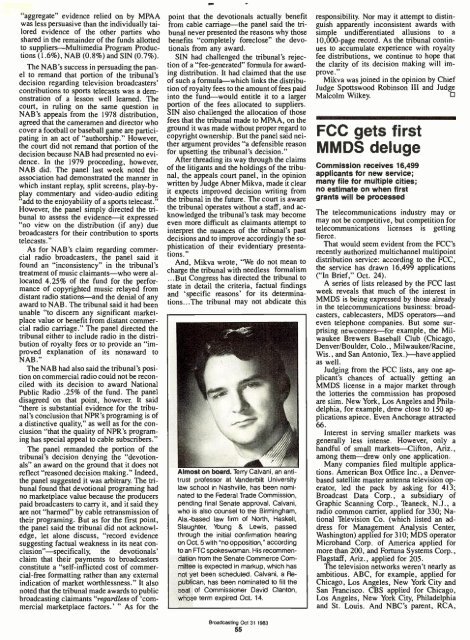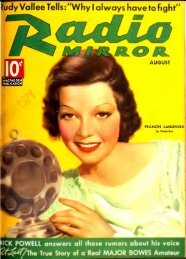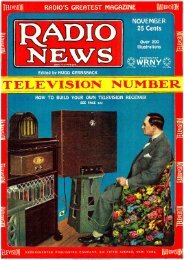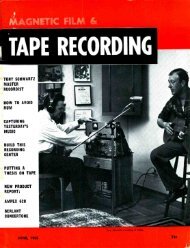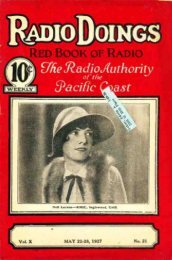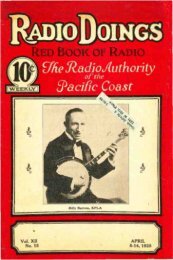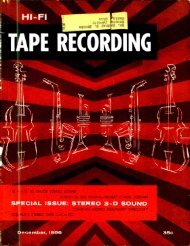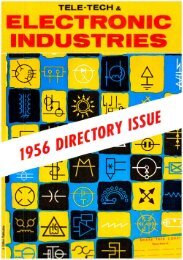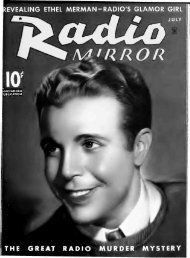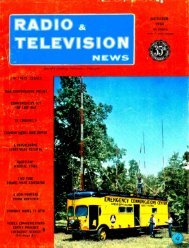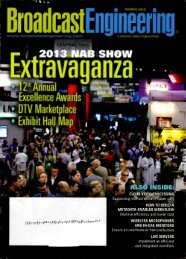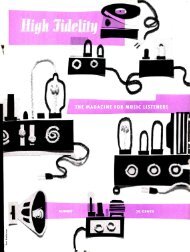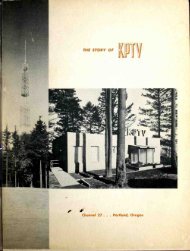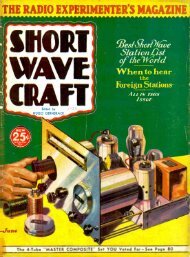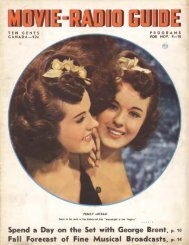Broadcasting Oct 31 - American Radio History
Broadcasting Oct 31 - American Radio History
Broadcasting Oct 31 - American Radio History
You also want an ePaper? Increase the reach of your titles
YUMPU automatically turns print PDFs into web optimized ePapers that Google loves.
"aggregate" evidence relied on by MPAA<br />
was less persuasive than the individually tai-<br />
lored evidence of the other parties who<br />
shared in the remainder of the funds allotted<br />
to suppliers -Multimedia Program Produc-<br />
tions (1.6 %), NAB (0.8 %) and SIN (0.7 %).<br />
The NAB 's success in persuading the pan-<br />
el to remand that portion of the tribunal's<br />
decision regarding television broadcasters'<br />
contributions to sports telecasts was a dem-<br />
onstration of a lesson well learned. The<br />
court, in ruling on the same question in<br />
NAB 's appeals from the 1978 distribution,<br />
agreed that the cameramen and director who<br />
cover a football or baseball game are partici-<br />
pating in an act of "authorship." However,<br />
the court did not remand that portion of the<br />
decision because NAB had presented no evi-<br />
dence. In the 1979 proceeding, however,<br />
NAB did. The panel last week noted the<br />
association had demonstrated the manner in<br />
which instant replay, split screens, play -by-<br />
play commentary and video -audio editing<br />
"add to the enjoyability of a sports telecast."<br />
However, the panel simply directed the tri-<br />
bunal to assess the evidence -it expressed<br />
"no view on the distribution (if any) due<br />
broadcasters for their contribution to sports<br />
telecasts."<br />
As for NAB's claim regarding commer-<br />
cial radio broadcasters, the panel said it<br />
found an "inconsistency" in the tribunal's<br />
treatment of music claimants -who were al-<br />
located 4.25% of the fund for the perfor-<br />
mance of copyrighted music relayed from<br />
distant radio stations -and the denial of any<br />
award to NAB. The tribunal said it had been<br />
unable "to discern any significant market-<br />
place value or benefit from distant commer-<br />
cial radio carriage." The panel directed the<br />
tribunal either to include radio in the distri-<br />
bution of royalty fees or to provide an "im-<br />
proved explanation of its nonaward to<br />
NAB."<br />
The NAB had also said the tribunal's posi-<br />
tion on commercial radio could not be recon-<br />
ciled with its decision to award National<br />
Public <strong>Radio</strong> .25% of the fund. The panel<br />
disagreed on that point, however. It said<br />
"there is substantial evidence for the tribu-<br />
nal's conclusion that NPR's programing is of<br />
a distinctive quality," as well as for the con-<br />
clusion "that the quality of NPR's program-<br />
ing has special appeal to cable subscribers."<br />
The panel remanded the portion of the<br />
tribunal's decision denying the "devotion-<br />
als" an award on the ground that it does not<br />
reflect "reasoned decision making." Indeed,<br />
the panel suggested it was arbitrary. The tri-<br />
bunal found that devotional programing had<br />
no marketplace value because the producers<br />
paid broadcasters to carry it, and it said they<br />
are not "harmed" by cable retransmission of<br />
their programing. But as for the first point,<br />
the panel said the tribunal did not acknowl-<br />
edge, let alone discuss, "record evidence<br />
suggesting factual weakness in its neat con-<br />
clusion"- specifically, the devotionals'<br />
claim that their payments to broadcasters<br />
constitute a "self- inflicted cost of commer-<br />
cial-free formatting rather than any external<br />
indication of market worthlessness." It also<br />
noted that the tribunal made awards to public<br />
broadcasting claimants "regardless of 'com-<br />
mercial marketplace factors.' " As for the<br />
point that the devotionals actually benefit<br />
from cable carriage -the panel said the tri-<br />
bunal never presented the reasons why those<br />
benefits "completely foreclose" the devo-<br />
tionals from any award.<br />
SIN had challenged the tribunal's rejec-<br />
tion of a "fee- generated" formula for award-<br />
ing distribution. It had claimed that the use<br />
of such a formula -which links the distribu-<br />
tion of royalty fees to the amount of fees paid<br />
into the fund -would entitle it to a larger<br />
portion of the fees allocated to suppliers.<br />
SIN also challenged the allocation of those<br />
fees that the tribunal made to MPAA, on the<br />
ground it was made without proper regard to<br />
copyright ownership. But the panel said nei-<br />
ther argument provides "a defensible reason<br />
for upsetting the tribunal's decision."<br />
After threading its way through the claims<br />
of the litigants and the holdings of the tribu-<br />
nal, the appeals court panel, in the opinion<br />
written by Judge Abner Mikva, made it clear<br />
it expects improved decision writing from<br />
the tribunal in the future. The court is aware<br />
the tribunal operates without a staff, and ac-<br />
knowledged the tribunal's task may become<br />
even more difficult as claimants attempt to<br />
interpret the nuances of the tribunal's past<br />
decisions and to improve accordingly the so-<br />
phistication of their evidentiary presenta-<br />
tions."<br />
And, Mikva wrote, "We do not mean to<br />
charge the tribunal with needless formalism<br />
...But Congress has directed the tribunal to<br />
state in detail the criteria, factual findings<br />
and 'specific reasons' for its determina-<br />
fons...The tribunal may not abdicate this<br />
Almost on board. Terry Galvani, an anti-<br />
trust professor at Vanderbilt University<br />
law school in Nashville, has been nomi-<br />
nated to the Federal Trade Commission,<br />
pending final Senate approval. Calvani,<br />
who is also counsel to the Birmingham,<br />
Ala-based law firm of North, Haskell,<br />
Slaughter, Young & Lewis, passed<br />
through the initial confirmation hearing<br />
on <strong>Oct</strong>. 5 with "no opposition," according<br />
to an FTC spokeswoman. His recommen-<br />
dation from the Senate Commerce Com-<br />
mittee is expected in markup, which has<br />
not yet been scheduled. Galvani, a Re-<br />
publican, has been nominated to fill the<br />
seat of Commissioner David Clanton,<br />
whose term expired <strong>Oct</strong>. 14.<br />
<strong>Broadcasting</strong> <strong>Oct</strong> <strong>31</strong> 1983<br />
55<br />
responsibility. Nor may it attempt to distin-<br />
guish apparently inconsistent awards with<br />
simple undifferentiated allusions to a<br />
10,000 -page record. As the tribunal contin-<br />
ues to accumulate experience with royalty<br />
fee distributions, we continue to hope that<br />
the clarity of its decision making will im-<br />
prove."<br />
Mikva was joined in the opinion by Chief<br />
Judge Spottswood Robinson III and Judge<br />
Malcolm Wilkey.<br />
FCC gets first<br />
MMDS deluge<br />
Commission receives 16,499<br />
applicants for new service;<br />
many file for multiple cities;<br />
no estimate on when first<br />
grants will be processed<br />
The telecommunications industry may or<br />
may not be competitive, but competition for<br />
telecommunications licenses is getting<br />
fierce.<br />
That would seem evident from the FCC's<br />
recently authorized multichannel multipoint<br />
distribution service: according to the FCC,<br />
the service has drawn 16,499 applications<br />
( "In Brief," <strong>Oct</strong>. 24).<br />
A series of lists released by the FCC last<br />
week reveals that much of the interest in<br />
MMDS is being expressed by those already<br />
in the telecommunications business: broad-<br />
casters, cablecasters, MDS operators -and<br />
even telephone companies. But some sur-<br />
prising newcomers -for example, the Mil-<br />
waukee Brewers Baseball Club (Chicago,<br />
Denver /Boulder, Colo., Milwaukee/Racine,<br />
Wis., and San Antonio, Tex.) -have applied<br />
as well.<br />
Judging from the FCC lists, any one ap-<br />
plicant's chances of actually getting an<br />
MMDS license in a major market through<br />
the lotteries the commission has proposed<br />
are slim. New York, Los Angeles and Phila-<br />
delphia, for example, drew close to 150 ap-<br />
plications apiece. Even Anchorage attracted<br />
66.<br />
Interest in serving smaller markets was<br />
generally less intense. However, only a<br />
handful of small markets-Clifton, Ariz.,<br />
among them -drew only one application.<br />
Many companies filed multiple applica-<br />
tions. <strong>American</strong> Box Office Inc., a Denver -<br />
based satellite master antenna television op-<br />
erator, led the pack by asking for 413;<br />
Broadcast Data Corp., a subsidiary of<br />
Graphic Scanning Corp., Teaneck, N.J., a<br />
radio common carrier, applied for 330; Na-<br />
tional Television Co. (which listed an ad-<br />
dress for Management Analysis Center,<br />
Washington) applied for <strong>31</strong>0; MDS operator<br />
Microband Corp. of America applied for<br />
more than 200, and Fortuna Systems Corp.,<br />
Flagstaff, Ariz., applied for 205.<br />
The television networks weren't nearly as<br />
ambitious. ABC, for example, applied for<br />
Chicago, Los Angeles, New York City and<br />
San Francisco. CBS applied for Chicago,<br />
Los Angeles, New York City, Philadelphia<br />
and St. Louis. And NBC's parent, RCA,


